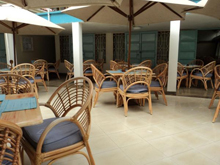Navigation
From Bamboo Bikes to Biomass Briquettes: UNEP Unveils SEED Award Winners
The SEED Awards recognize inspiring social and environmental entrepreneurs whose businesses can help meet sustainable development challenges.
|
A novel solar device that turns waste heat into electricity in rural China, a Ugandan business that manufactures stationary from agricultural waste, a bamboo bicycle project in Ghana and a female-run business in South Africa making a hand-held laundry device that saves water are among the 30 winners of the 2010 SEED Awards, the United Nations Environment Programme (UNEP) announced on November 3, 2010.
The SEED Awards recognize inspiring social and environmental entrepreneurs whose businesses can help meet sustainable development challenges. By helping entrepreneurs to scale-up their activities, the SEED Initiative, which is hosted by UNEP, aims to boost local economies and tackle poverty, while promoting the sustainable use of resources and ecosystems.
This year, in addition to seeking innovative start-ups throughout the developing world, the SEED Awards had a special focus on Africa, placing particular emphasis on initiatives from South Africa, Burkina Faso, Kenya, Egypt, Ghana, Rwanda and Senegal. This focus was part of a larger project linked with UNEP's Green Economy Initiative and was funded largely by the
European Union.
The 2010 SEED Award winners (by country):
Burkina Faso:
"Manufacture and Popularization of Biomass Briquettes"
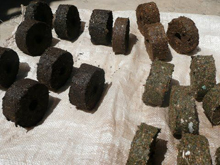 |
| “Manufacture and Popularization of Biomass Briquettes”. Aiming to replace wood and charcoal with biomass briquettes from fallen leaves and other sources of unused biomass, this progressive enterprise of local and international NGOs and a research institution helps to combat desertification, create jobs in rural communities and raise awareness for alternative energy sources. |
"Initiative for Promoting and Distributing Bio-Pesticides"
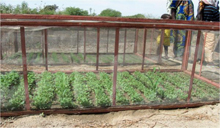 |
| “Initiative for Promoting and Distributing Bio-Pesticides”. The initiative’s ambitious goal is to promote and distribute ecological pest control for organic crops, especially cotton, vegetable and oil-producing crops. In this way, the partnership of local and community-based organisations and research agencies hopes to increase yields and preserve the production environment. |
China:
"SolSource"
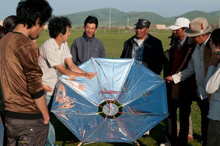 |
| "SolSource" is a satellite dish-shaped solar device with removable modules that turns its own waste heat into electricity or stores it in thermal fabrics for later use. This novel device, which has been developed by international social enterprise, research and government institutions, and electricity for low-income families at an affordable price. |
Colombia:
"Bosque Humedo Biodiverso"
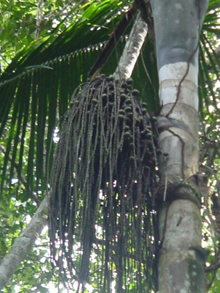 |
| "Bosque Humedo Biodiverso" is a business initiative headed by a local NGO that uses fruit and pulp as ingredients for the local cosmetics and food industries. The use of non-timber products will reduce deforestation of tropical forests and local families will benefit from collecting value-added goods. This helps develop alternative income sources and promotes the sustainable management of local biodiversity. |
Ghana:
"The Shea Economic Empowerment Program (SEEP)"
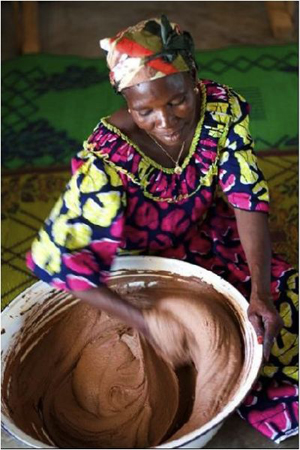 |
| Woman kneading shea butter. "The Shea Economic Empowerment Program (SEEP)." This fruitful partnership centred on a community-based cooperative and international NGOs seeks to improve the livelihoods of women Shea nut producers by offering training, greater ownership within the supply chain and access to improved technology. |
** See video at the end of this article and related articles on the Horizon Solutions Site:
Research and development of the shea tree and its products and
The Songtaaba Women’s Group.**
"G-lish: Income Generation, Re-Generation, Next Generation"
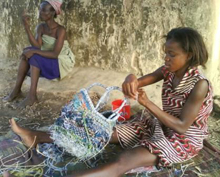 |
| “G-lish: Income Generation, Re-Generation, Next Generation”. The aim of this remarkable initiative of local NGOs is to provide value-added income for rural communities by crafting baskets from recycled materials. In doing so, they preserve the age-old basket-weaving tradition and carry out extensive tree-planting operations. |
"High-value Syrup from 'Prekese' Fruits for Community Livelihood Empowerment": Relying on local raw materials, the partners of this promising initiative strive to establish the sustainable cultivation and harvesting of Prekese fruits in rural communities, allowing income to be generated over the whole life cycle of the tree.
"Ghana Bamboo Bikes Initiative"
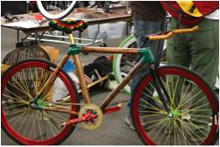 |
| “Ghana Bamboo Bikes Initiative” is a youth-led, non-profit enterprise committed to the economic empowerment of youth by taking advantage of the abundant bamboo raw materials in Ghana to manufacture and assemble high-quality bamboo bikes – suitable for the road conditions and terrain in Ghana and affordable to the poor. |
"DeCo! - Decentralized Composting for Sustainable Farming and Development": The composting firm DeCO! benefits local farmers by producing organic fertilizer in decentralized composting plants following a low-tech approach. By working with local NGOs, government and research institutes, DeCO! aims to inform and educate farmers about the advantages of sustainable soil management.
"Biofuel Production in Promoting Sustainable Land Management": A local NGO in partnership with national research institutions has established a model for rehabilitating degraded community lands, producing food crop and utilizing renewable energy through the cultivation and processing of sunflower plants into oil and biodiesel. Their sustainable land management approach also includes bee-keeping.
Kenya:
"Backpack Farm Agriculture Programme": This initiative enables food autonomy for rural communities by providing small landholders with a dynamic set of agricultural tools, comprehensive training and monitoring -- delivered and distributed in a canvas backpack.
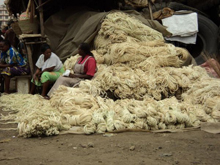 |
"Papyrus Reeds, Our Future Hope" is a sustainable enterprise that harvests and processes papyrus reeds and crafts them into high-quality baskets, purses, carpets, chairs, sleeping mats and blankets, using the waste as natural manure. Community-based youth organizations and a local research institution implement the initiative.
"Solanterns: Replacing 1 Million Kerosene Lanterns with 1 Million Solar Lanterns": The partners of this innovative initiative are a private company, a local NGO and a microfinance institution that provide economic, environmental and health benefits to both rural and urban households by sourcing and distributing solar lanterns and training youth micro-entrepreneurs.
"Community-Based Medicinal Plant Enterprise for Biodiversity Conservation": This pioneering enterprise, initiated by a community-based organisation and national and international government and research institutions, generates alternative means of income and awareness for the value of biodiversity within rural communities based on the commercial cultivation and processing of indigenous medicinal plants.
"Village Cereal Aggregation Centres (VCAC)": A local commercial entity has joined forces with the national Government, the financial sector and cereal buyers to establish mobile post-harvest management centres in villages -- enabling farmers to deliver high-quality grain to the market value chain and encouraging more participation of youth in cereal production.
"EcoPost - Fencing Posts from Recycled Post-Consumer Waste Plastic": International and national NGOs have launched this unique initiative to recycle waste plastic into aesthetic, durable and environmentally-friendly fencing posts and consequently reduce plastic litter on streets and open fields. By providing an alternative fencing material to traditional wood, EcoPost contributes towards the conservation of forests.
"Commercialization of Prosopis Juliflora Products from Affected Areas"
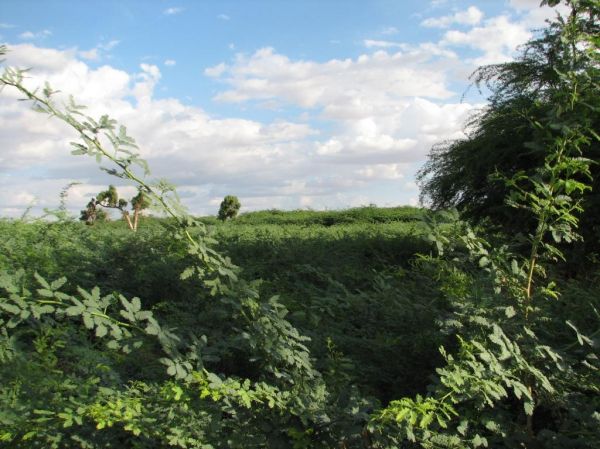 |
| “Commercialization of Prosopis Juliflora Products from Affected Areas”. A local community-based NGO, the FAO and a Kenyan company and research institute have mobilized efforts to control the undesirable spread of the Prosopis tree by promoting its commercial use as charcoal, timber and pods for livestock feed. The development of a sustainable national market will maximize returns to local communities. |
Rwanda:
"Production and Distribution of Pressurized Biogas in Gas Cylinders": This initiative has been developed by a private company, an international NGO and government organizations to produce and store pressurized biogas for cooking made from urban, domestic and industrial wastes. Environmental benefits are achieved by offering an alternative firing material to firewood and charcoal.
“Efficient Charcoal Production and Smoke Recycling"
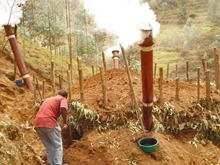 |
| “Efficient Charcoal Production and Smoke Recycling”. This partnership of international NGOs, government institutions and a reforestation initiative is promoting new technologies to increase the energy output of charcoal. As a result, this significantly reduces the amount of forestland used for the production of charcoal and lessens air pollution by recycling tar and other smoke components |
Senegal:
"Micro Power Economy for Rural Electrification"
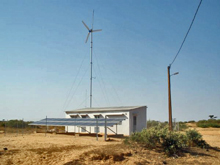 |
| “Micro Power Economy for Rural Electrification”. The goal of this enterprise involving local partners from the private and microfinance sector is to set up a profitable rural power provider based on off-grid power system operation and the utilisation of renewable energy sources, such as wind-solar-diesel hybrid power systems. |
“Flower of Hope”: This pioneering franchising initiative set up by a community-based organization, international NGOs and research and finance institutions aims to improve agricultural development by training resource-poor community groups to become successful agricultural entrepreneurs, thereby generating more income for local communities.
“Kayor Rural Energy, Rural Electrification by Photovoltaic Solar Energy": An outstanding pilot enterprise launched by a community-based organization that aims to provide solar energy solutions for rural communities. The partnership with microfinance institutions permits Kayor clients to finance their equipment with microcredit adapted to their means.
South Africa:
“Resentse Sinqobile Trust Trading as Zondi BuyBack Initiative": A local NGO and government institutions have teamed up to establish this comprehensive buyback centre to recycle, reshape and sell household waste such as cans and plastic. Natural resource protection, the reduction of litter, increased employment opportunities and an educational programme are
among the impressive results of this initiative.
IziWasha Two social enterprises and a private company have developed this innovative hand-held laundry device to facilitate washing in low-income communities. As the appliance does not rely on electricity or a home water supply, IziWasha significantly cuts water and energy use. A network of female micro-franchisees who distribute the eco-friendly product will directly benefit from the revenues.
“Reclaiming Livelihoods - Mooi River Waste Reclaiming"
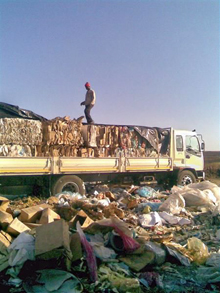 |
| “Reclaiming Livelihoods – Mooi River Waste Reclaiming”. This initiative led by a community-based organization, an international NGO and a government department has a high impact on local waste pickers who earn an income from recycling waste. By formalising the workforce and providing shelter, protective clothes and technical equipment, attractive job opportunities are created. |
“Amatola Wild Trout Fishery"
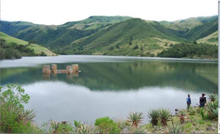 |
| “Amatola Wild Trout Fishery” is the first recreational fly-fishery in South Africa owned and managed by a local community. Set up by a partnership between a NGO and a research institution, the fishery brings a high-end market tourism activity into a rural area, while focusing on skills training and job creation for local people and environmental improvement by sustaining water quality and wild trout populations. |
"Food & Trees for Africa" is a social enterprise addressing the greening of urban areas, climate change and food insecurity by planting trees. Launched by a local and international NGO, government institutions and private businesses, FTFA offers skills training in natural resource
management and develops organic permaculture gardens for impoverished communities. The project has also designed a carbon calculator.
"Claire Reid Reel Gardening" provides consumers with a pre-fertilized seed strip that encases seeds at the correct depth and distance apart and offers planting instructions in seven languages. Implemented by a youth organization with assistance from government and social development
programmes, the initiative aims to create sustainable subsistence gardens throughout South Africa.
Sri Lanka:
"The Rural Enterprise Network (REN)"
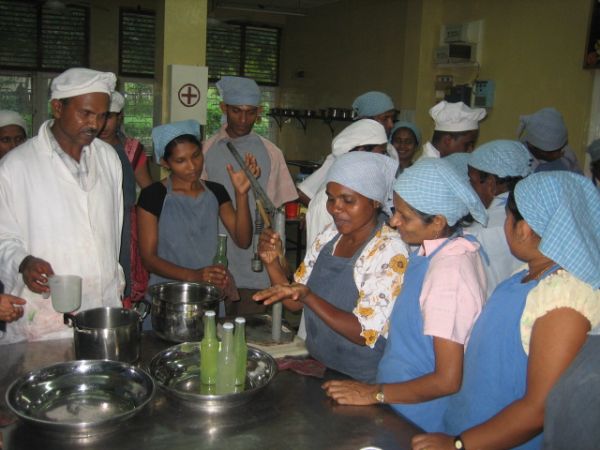 |
| The “Rural Enterprise Network (REN)” aims at linking small-scale farmers to input-output markets through improved product quality, access to market information and the establishment of a common brand. By organizing producers in a network of organic agro- and food processing enterprises, the farmers will benefit from joint marketing services. |
Uganda:
"Oribags Innovations (U) Ltd."
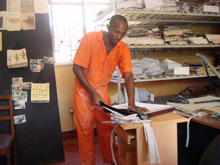 |
| “ORIBAGS INNOVATIONS (U) LTD” is a private enterprise initiated by a research institution and local NGO to manufacture hand-made paper bags, printing paper and jewellery from agricultural wastes including wheat straw, elephant grass and other natural fibres. Oribags offers an eco-friendly alternative to polythene bags and empowers women entrepreneurs. |
Additional information on all of the SEED winners can be found on the SEED Web site at www.seedinit.org
Achim Steiner, UN Under-Secretary-General and UNEP Executive Director, said: "The SEED Award winners exemplify the strong spirit of entrepreneurship in the developing world and its significance in creating a Green Economy. While the Awards recognize individual outstanding projects, Governments must also show leadership in supporting grassroots efforts through diverse and dynamic standards, forward-looking policies and incentives to further catalyze corporate and community-led change."
All the SEED winners will be honoured at award ceremonies in their home countries. The prize they will receive from SEED is a package of individually-tailored support for their business. This includes access to relevant expertise and technical assistance, meeting new partners and
building networks, developing business plans and identifying sources of finance. SEED will furthermore contribute towards meeting each winner's most immediate needs by contributing to a jointly developed support plan.
The 2010 call for proposals saw applications from just under 60 countries, representing the collaborative efforts of non-governmental organizations, women's and youth groups, labour organizations, public authorities, international agencies and academia. While most of the applications were in the agriculture and rural development sector, many entries addressed
issues around climate change and energy, the conservation of biodiversity, and waste management. The selection of the winners was by an independent international jury of experts.
Notes:
SEED Initiative
The SEED Initiative is a global network founded in 2002 by UNEP, the UN Development Programme (UNDP) and the International Union for Conservation of Nature (IUCN) to contribute towards the Millennium Development Goals (MDGs) and the commitments made at the Johannesburg World Summit on Sustainable Development. SEED works through a global network of partners, supporters and associates.
SEED identifies, profiles and supports promising, locally-driven start-up enterprises working in partnership in developing countries to improve livelihoods, tackle poverty and marginalization and manage natural resources sustainably. The Initiative also develops learning resources for
the broad community of social and environmental entrepreneurs, informs policy- and decision-makers and aims to inspire innovative, entrepreneurial approaches to sustainable development.
2010 SEED International Jury
The 2010 SEED Award winners were selected by the independent international jury which very kindly dedicated considerable time to choosing the most promising of the applications. The members of the jury are:
Helmy Abouleish, Managing Director, SEKEM Group, Egypt
Leila Akahloun, Integrator for Africa Programmes, Ashoka
Walter Baets, Dean, University of Cape Town Graduate School of Business
Nancy Chege, National Coordinator Kenya, GEF Small Grants Programme
Elisea Bebet Gillera Gozun, former Minister of Environment in the Philippines
Paul Laird, Corporate Partnerships Manager, Earthwatch, UK
Richard Lewis, Partner, Hogan Lovells
Alejandro Litovsky, Director, Volans Ventures Ltd
Brian Milder, Director of Strategy and Innovation, Root Capital
Kofi Nketsia-Tabiri, Regional Manager, E + Co Africa
Kirsten Spainhower, Innovation Practice, World Bank Institute
Sarah Timpson, Senior Adviser on Community-based Initiatives, UNDP
This news was provided by the UN Environment Programme 3 November 2010.
All photographs are courtesy of SEED.
Making shea butter in Burkina Faso from Horizon International's TV program "Burkina-be People with a Future," hosted by Raso Ouedrago and narrated by Lynn Redgrave.
Search
Latest articles
Agriculture
- World Water Week: Healthy ecosystems essential to human health: from coronavirus to malnutrition Online session Wednesday 24 August 17:00-18:20
- World Water Week: Healthy ecosystems essential to human health: from coronavirus to malnutrition Online session Wednesday 24 August 17:00-18:20
Air Pollution
- "Water and Sanitation-Related Diseases and the Changing Environment: Challenges, Interventions, and Preventive Measures" Volume 2 Is Now Available
- Global Innovation Exchange Co-Created by Horizon International, USAID, Bill and Melinda Gates Foundation and Others
Biodiversity
- It is time for international mobilization against climate change
- World Water Week: Healthy ecosystems essential to human health: from coronavirus to malnutrition Online session Wednesday 24 August 17:00-18:20
Desertification
- World Water Week: Healthy ecosystems essential to human health: from coronavirus to malnutrition Online session Wednesday 24 August 17:00-18:20
- UN Food Systems Summit Receives Over 1,200 Ideas to Help Meet Sustainable Development Goals
Endangered Species
- Mangrove Action Project Collaborates to Restore and Preserve Mangrove Ecosystems
- Coral Research in Palau offers a “Glimmer of Hope”
Energy
- Global Innovation Exchange Co-Created by Horizon International, USAID, Bill and Melinda Gates Foundation and Others
- Wildlife Preservation in Southeast Nova Scotia
Exhibits
- Global Innovation Exchange Co-Created by Horizon International, USAID, Bill and Melinda Gates Foundation and Others
- Coral Reefs
Forests
- NASA Satellites Reveal Major Shifts in Global Freshwater Updated June 2020
- Global Innovation Exchange Co-Created by Horizon International, USAID, Bill and Melinda Gates Foundation and Others
Global Climate Change
- It is time for international mobilization against climate change
- It is time for international mobilization against climate change
Global Health
- World Water Week: Healthy ecosystems essential to human health: from coronavirus to malnutrition Online session Wednesday 24 August 17:00-18:20
- More than 400 schoolgirls, family and teachers rescued from Afghanistan by small coalition
Industry
- "Water and Sanitation-Related Diseases and the Changing Environment: Challenges, Interventions, and Preventive Measures" Volume 2 Is Now Available
- Global Innovation Exchange Co-Created by Horizon International, USAID, Bill and Melinda Gates Foundation and Others
Natural Disaster Relief
- STOP ATTACKS ON HEALTH CARE IN UKRAINE
- Global Innovation Exchange Co-Created by Horizon International, USAID, Bill and Melinda Gates Foundation and Others
News and Special Reports
- World Water Week: Healthy ecosystems essential to human health: from coronavirus to malnutrition Online session Wednesday 24 August 17:00-18:20
- STOP ATTACKS ON HEALTH CARE IN UKRAINE
Oceans, Coral Reefs
- World Water Week: Healthy ecosystems essential to human health: from coronavirus to malnutrition Online session Wednesday 24 August 17:00-18:20
- Mangrove Action Project Collaborates to Restore and Preserve Mangrove Ecosystems
Pollution
- Zakaria Ouedraogo of Burkina Faso Produces Film “Nzoue Fiyen: Water Not Drinkable”
- "Water and Sanitation-Related Diseases and the Changing Environment: Challenges, Interventions, and Preventive Measures" Volume 2 Is Now Available
Population
- "Water and Sanitation-Related Diseases and the Changing Environment: Challenges, Interventions, and Preventive Measures" Volume 2 Is Now Available
- "Water and Sanitation-Related Diseases and the Changing Environment: Challenges, Interventions, and Preventive Measures" Volume 2 Is Now Available
Public Health
- Honouring the visionary behind India’s sanitation revolution
- Honouring the visionary behind India’s sanitation revolution
Rivers
- World Water Week: Healthy ecosystems essential to human health: from coronavirus to malnutrition Online session Wednesday 24 August 17:00-18:20
- Mangrove Action Project Collaborates to Restore and Preserve Mangrove Ecosystems
Sanitation
- Honouring the visionary behind India’s sanitation revolution
- Honouring the visionary behind India’s sanitation revolution
Toxic Chemicals
- "Water and Sanitation-Related Diseases and the Changing Environment: Challenges, Interventions, and Preventive Measures" Volume 2 Is Now Available
- Actions to Prevent Polluted Drinking Water in the United States
Transportation
- "Water and Sanitation-Related Diseases and the Changing Environment: Challenges, Interventions, and Preventive Measures" Volume 2 Is Now Available
- Urbanization Provides Opportunities for Transition to a Green Economy, Says New Report
Waste Management
- Honouring the visionary behind India’s sanitation revolution
- Honouring the visionary behind India’s sanitation revolution
Water
- Honouring the visionary behind India’s sanitation revolution
- Honouring the visionary behind India’s sanitation revolution
Water and Sanitation
- Honouring the visionary behind India’s sanitation revolution
- Honouring the visionary behind India’s sanitation revolution

